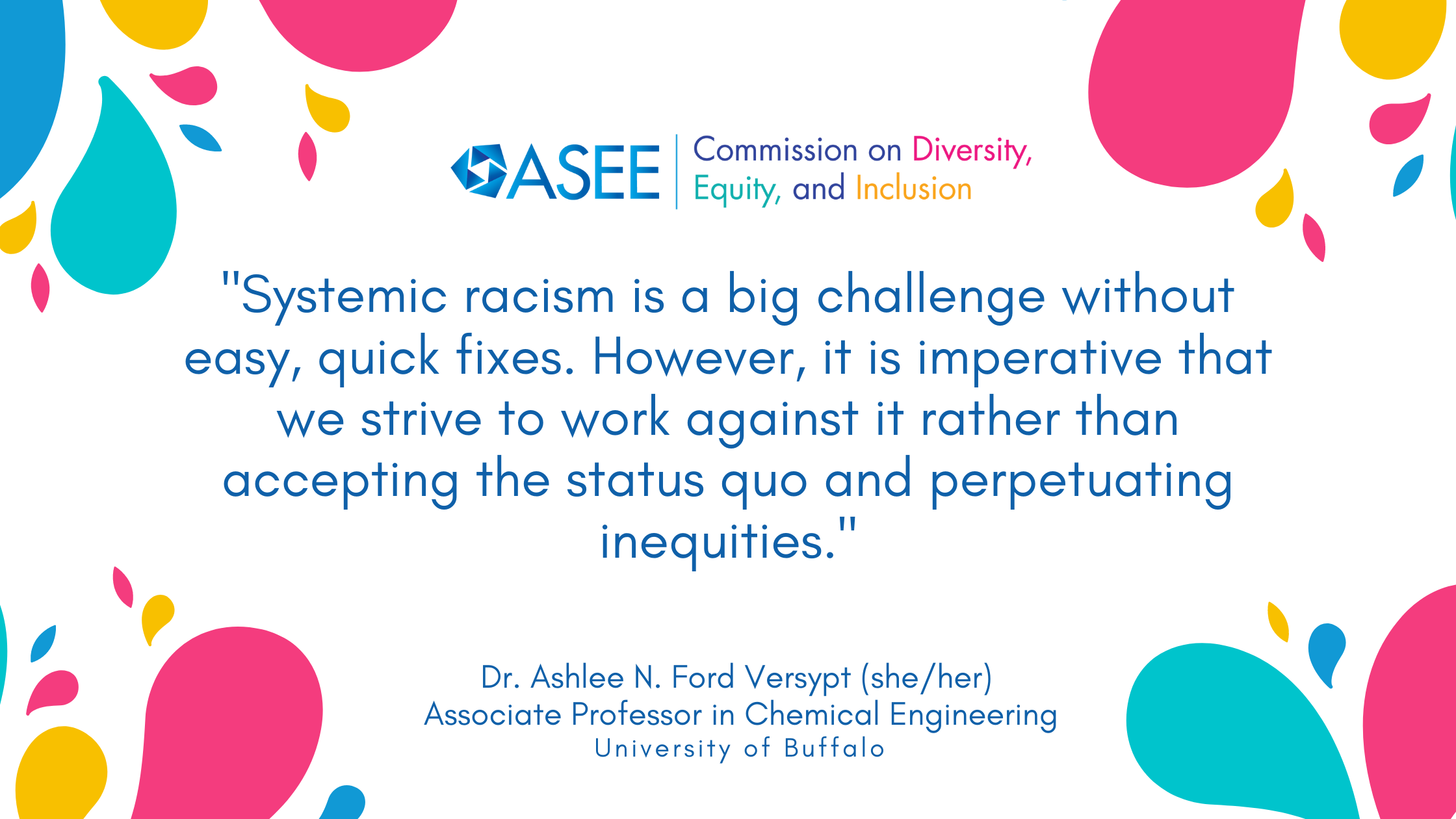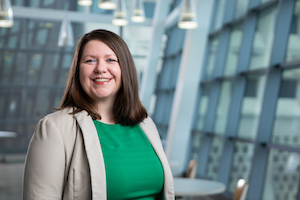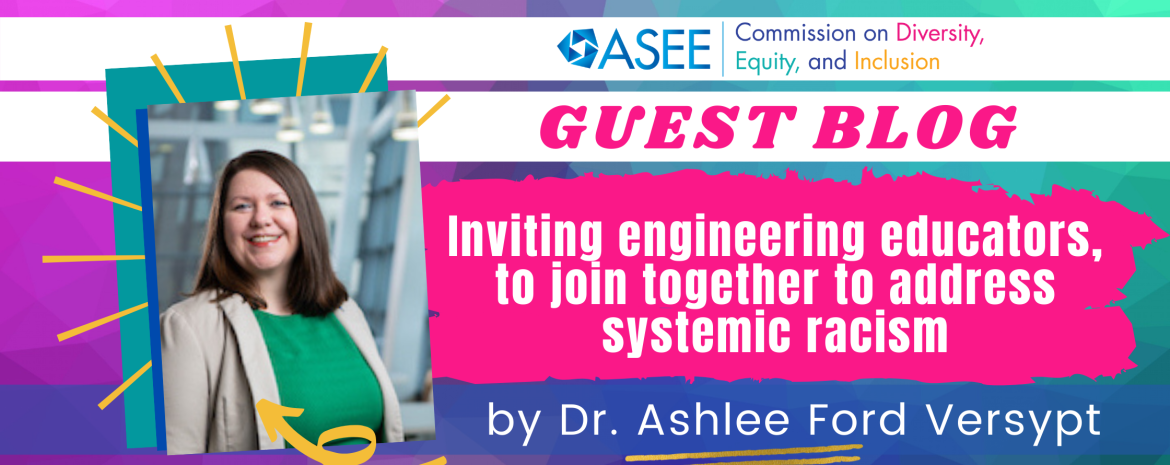What can I do about systemic racism as an engineering educator?
By Dr. Ashlee N. Ford Versypt
What can I do about systemic racism as an engineering educator? This is the central question that I, and probably many of you, faced in June 2020 after the murders of George Floyd, Breonna Taylor, and Ahmaud Arbery by police and vigilantes and the subsequent rise in important discussions around systemic racism in American society. Impactful answers came to me through three important routes.
1. A group of Black counseling psychologists and their colleagues organized a multi-day online anti-racism training workshop titled Academics for Black Survival and Wellness. This transformative experience asked participants to make action plans around the question of what can we do in our spheres of influence?
2. Through social media I learned of the Black in Engineering call to action On Becoming an Anti-Racist University, which provided actionable steps for universities and those in higher education settings to take.
3. In the ASEE Commission on Diversity, Equity, and Inclusion Leadership’s Call to ASEE Members to Join the Work of Disrupting Racism, the following statements personally convicted me: “I remind you that ASEE is you; it is me; it is us. For ASEE to ‘do something,’ WE must do something…ASEE can only change the status quo if each of us commits to begin and sustain action.”
Around this same time, I started my term as the chair of the ASEE Chemical Engineering Division. All signs were pointing to me using my term in this office as my sphere of influence to invite other engineering educators, particularly chemical engineers, to join together to address systemic racism and broadening inclusion in our field and in our educational spaces for students, staff, and colleagues.
In July 2020, I launched a weekly Zoom discussion forum called the Conversation Series on Inclusion and Thriving to connect chemical engineering educators around equipping ourselves to make impacts in our local environments and more collectively in the field to address systemic racism. From the onset, I acknowledged my perspectives as a white woman in a tenured faculty position without training as a critical scholar, historian, or social scientist, but with interest in learning from scholars on race and equity. I offered others in the chemical engineering education community regular space and time to talk together to grow and learn about these topics and best practices. A brief report on the Conversation Series is available online, and our favorite media resources are curated in a shared document.

What did we gain from our Conversation Series virtual community of practice experience that you can use today?
First, build your team. Connecting with others either locally or through broader communities is great for getting ideas and having support for putting the ideas into action.
Second, define your system. Equip yourself with background knowledge of existing inequities and learning from lived experiences of those that have been historically excluded or marginalized in society, in engineering higher education, and by engineering practices. This is important for defining the problems we seek to address. Don’t make people with marginalized identities relive trauma just to provide educational opportunities to those with dominant identities. Instead, look to the vast array of published accounts that already exist for perspectives, definitions, and data, e.g., the 1619 Project is a rich starting point accessible to general audiences. You don’t need to wait to collect data in your local institution or program to prove that issues exist. Trust that if they exist elsewhere, that they also exist in your environment. You may not even have the number of people from historically excluded groups to effectively survey them to hear their voices and perspectives without revealing their identities or perpetuating other harms.
Third, take action now, every day, and with an escalating growth mindset. Systemic racism is a big challenge without easy, quick fixes. However, it is imperative that we strive to work against it rather than accepting the status quo and perpetuating inequities. Each seemingly small step against it breaks down barriers. Without consistent action though, small steps aren’t enough. As we gain traction towards addressing the root causes not just the surface symptoms, the more sustainable the impacts will become.
What action has resulted so far? For the Chemical Engineering Division (and in partnership with the AIChE Engineering Education Division) beyond the initial Conversation Series, two semester-long book clubs have been conducted led by other chemical engineering educators. The first covered What Inclusive Instructors Do: Principles and Practices for Excellence in College Teaching [1], which has many great practical suggestions of actions that you can take in your classrooms, and the second is ongoing and covers Teaching to Trangress: Education as the Practice of Freedom [2].
Another virtual community of practice is continuing around the theme of taking action on inclusive teaching in chemical engineering classrooms. The facilitators are leading participants through exploration, adoption, and assessment of inclusive teaching practices that aim to reduce systemic barriers to chemical engineering. Multiple workshops were held at the ASEE and AIChE Annual Meetings providing training to participants. Additional sessions are planned for the 2022 Chemical Engineering Summer School targeted for junior faculty across the field. The approximately 50 chemical engineering educators who have participated in the virtual communities discussed here and the many more who’ve attended the in-person and online training sessions are taking actions big and small on their campuses or other workplaces and in their roles in the professions. Many of our participants/community members have started or joined initiatives in their local environments or at the professional society level to address and dismantle policies and practices that have led to or that perpetuate inequities.
References
[1] Addy, T. M., Dube, D., Mitchell, K. A., SoRelle, M. E., What Inclusive Instructors Do Principles and Practices for Excellence in College Teaching. 2021.
[2] hooks, b. Teaching to Transgress: Education As the Practice of Freedom. 1994.
About the Author
Ashlee Ford Versypt
 Dr. Ashlee N. Ford Versypt earned a B.S. from the University of Oklahoma and an M.S. and a Ph.D. from the University of Illinois, all in Chemical Engineering. She did her postdoc at MIT. She started her academic career at Oklahoma State University before joining the University at Buffalo as a tenured associate professor in January 2021. Dr. Ford Versypt leads the Systems Biomedicine and Pharmaceutics Laboratory. She has received a number of awards for her research, teaching, and service including the NSF CAREER Award, ASEE Chemical Engineering Division Fahien Award, ASEE Midwest Section Service Award, and AIChE 35 Under 35. She was the 2020-2021 Chair of the ASEE Chemical Engineering Division and is a trustee of the Computer Aids for Chemical Engineering non-profit.
Dr. Ashlee N. Ford Versypt earned a B.S. from the University of Oklahoma and an M.S. and a Ph.D. from the University of Illinois, all in Chemical Engineering. She did her postdoc at MIT. She started her academic career at Oklahoma State University before joining the University at Buffalo as a tenured associate professor in January 2021. Dr. Ford Versypt leads the Systems Biomedicine and Pharmaceutics Laboratory. She has received a number of awards for her research, teaching, and service including the NSF CAREER Award, ASEE Chemical Engineering Division Fahien Award, ASEE Midwest Section Service Award, and AIChE 35 Under 35. She was the 2020-2021 Chair of the ASEE Chemical Engineering Division and is a trustee of the Computer Aids for Chemical Engineering non-profit.
Connect with our guest blogger
Do you want to become a guest blogger?
CDEI Guest Blog highlight future events, describe best practices, or share calls to action by CDEI members. We invite you to propose posts that share brief research highlights, reports of impactful initiatives, critical thought pieces, and resources you find useful. We especially encourage emerging scholars to share their work. If you are interested in sharing a blog or resource post, you may submit your proposal here. All posts are screened and edited.

